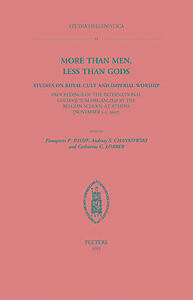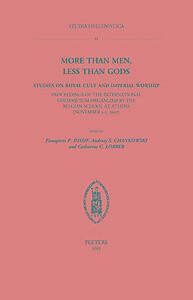
- Afhalen na 1 uur in een winkel met voorraad
- Gratis thuislevering in België vanaf € 30
- Ruim aanbod met 7 miljoen producten
- Afhalen na 1 uur in een winkel met voorraad
- Gratis thuislevering in België vanaf € 30
- Ruim aanbod met 7 miljoen producten
Zoeken
More Than Men, Less Than Gods
Studies on Royal Cult and Imperial Worship: Proceedings of the International Colloquium Organized by the Belgian School at Athens (November 1-2, 2007)
P.P. Iossif, A.S. Chankowski
€ 196,95
+ 393 punten
Omschrijving
More Than Men, Less Than Gods is conceived as a demonstration project, with the goal of opening new perspectives in the study of Graeco-Roman ruler worship. A principal emphasis is placed on the effectiveness of a multidisciplinary approach to the subject. The present volume points to some possible forerunners to Hellenistic royal cult and emperor worship, or at least to the concept of the divine king, to supplement the well-studied roots of ruler worship in the cultic life of the Greek polis and in pharaonic Egypt. More than Men... aspires to contribute to the debate relative to divine kingship, royal cult and emperor worship by opening new perspectives or reopening old ones. The focus is in eliciting some audacious and innovative approaches to such a complex phenomenon. All questions are not raised and certainly most of them are not answered here. In abandoning the sterile opposition between "political" and "religious", the volume's perspective transcends established notions conditioned by the Judeo-Christian model of western societies and scholarship, to consider the problem under different perspectives: there is no need to oppose "Greek" vs. "oriental", "rational" vs. "emotional" to understand the birth of the phenomenon. The diversity of approaches draws attention to the variety of sources that provide evidence relating to ruler worship, or that can enhance our understanding of the broader phenomenon of the divinization of powerful men. These include myth and historical accounts preserved by ancient authors; dedicatory inscriptions; clay tablets; papyri; architectural decoration and other archaeological remains; statuary, cameos, gems and various minor arts; seal impressions; and coins.
Specificaties
Betrokkenen
- Auteur(s):
- Uitgeverij:
Inhoud
- Aantal bladzijden:
- 753
- Taal:
- Engels
- Reeks:
- Reeksnummer:
- nr. 51
Eigenschappen
- Productcode (EAN):
- 9789042924703
- Verschijningsdatum:
- 6/12/2011
- Uitvoering:
- Paperback
- Formaat:
- Trade paperback (VS)
- Afmetingen:
- 160 mm x 236 mm
- Gewicht:
- 725 g

Alleen bij Standaard Boekhandel
+ 393 punten op je klantenkaart van Standaard Boekhandel
Beoordelingen
We publiceren alleen reviews die voldoen aan de voorwaarden voor reviews. Bekijk onze voorwaarden voor reviews.








